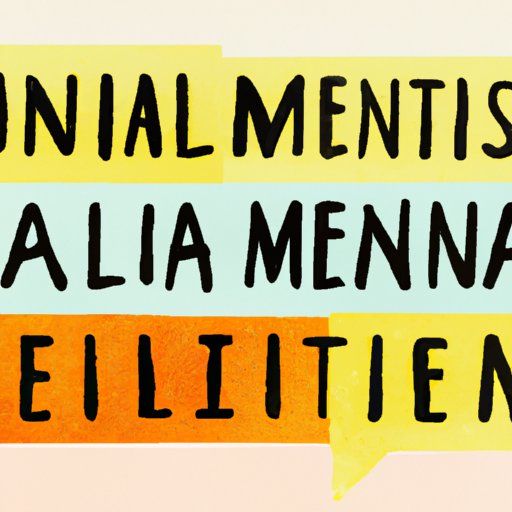
I. Introduction
If you’ve ever found yourself in a conversation with someone who just won’t stop talking, you know how frustrating and overwhelming it can be. But what if this constant chatter is a symptom of a deeper issue? Understanding the link between mental illness and excessive talking is crucial for both individuals who experience it and their loved ones. In this article, we’ll explore the causes and symptoms of excessive talking and provide tips for navigating connections between mental health and non-stop talking.
II. Understanding the Link Between Mental Illness and Excessive Talking
Excessive talking, also known as “verbal overload,” refers to the constant need to speak or communicate, often without regard for appropriate social or environmental contexts. It can differ from regular conversation in its volume, tone, and frequency. While many people may talk excessively due to personality traits or situational factors, it can also be a symptom of an underlying mental health condition. Conditions like bipolar disorder, schizophrenia, and attention deficit hyperactivity disorder (ADHD) have been linked to excessive talking.
Research findings support this link between mental illness and excessive talking. One study published in the Journal of Psychiatric Research found that excessive talk is significantly more common in people with bipolar disorder than those without it. Furthermore, the study found that excessive talk is a reliable predictor of manic episodes in people with bipolar disorder.
III. Breaking the Silence: Navigating the Connection Between Mental Health and Non-Stop Talking
Excessive talking can make social and interpersonal relationships difficult, leading to frustration, misunderstandings, and isolation. However, there are ways to communicate effectively with someone who exhibits excessive talking. One technique is to actively listen and show genuine interest in what the person is saying. It’s important to remember that excessive talking may be a symptom of an underlying mental health condition, and seeking professional help is crucial for both the individual and their loved ones.
IV. The Unspoken Side of Mental Illness: How Excessive Talking Can Be a Symptom
Excessive talking can be a symptom of an underlying mental health condition, but it’s often overlooked or misunderstood. It’s important to recognize and address excessive talking in the context of mental health to ensure timely treatment and support. For example, excessive talking may be a symptom of bipolar disorder during a manic episode, or it may be a symptom of anxiety when the person is nervous or overwhelmed.
It’s important to note that excessive talking may manifest differently depending on the mental health condition. For instance, in people with ADHD, excessive talking may be due to impulsivity or inability to regulate attention, while in people with schizophrenia, it may be due to disorganized thinking.
V. Chatty Cathy or Something More? Examining the Relationship Between Mental Illness and Verbal Overload
Excessive talking is often misunderstood or misinterpreted by others as attention-seeking or self-centered behavior. These misconceptions and stereotypes can lead to further isolation and stigma for those who experience it. Excessive talking may also be mistaken for normal conversation, making it harder to recognize as a symptom of a mental health condition.
It’s important to understand that excessive talking may be a sign of something more serious, especially if it persists despite attempts to curtail it. It may be an indication of an underlying mental health condition that requires attention and treatment.
VI. A Voice that Won’t Be Silenced: Addressing the Root Cause of Excessive Talking in Those with Mental Illness
Addressing the root cause of excessive talking in individuals with mental illness can be challenging but is vital for effective treatment and support. It’s important to recognize that excessive talking is a symptom of an underlying mental health condition and not a character flaw or personality trait. Encouraging individuals to seek professional help for their condition can support their journey to recovery.
There are tips and strategies that both individuals and their loved ones can use to manage excessive talking. For instance, identifying triggers and developing coping mechanisms can help to reduce excessive talking. Encouraging regular therapy and medication adherence can also support individuals with underlying mental health conditions.
VII. Conclusion
Understanding the link between mental illness and excessive talking is essential for both individuals who experience it and their loved ones. Excessive talking can be a sign of an underlying mental health condition that requires professional help, support, and understanding. By providing the right support and encouragement, individuals can address the root cause of their excessive talking and embark on a journey towards recovery.




